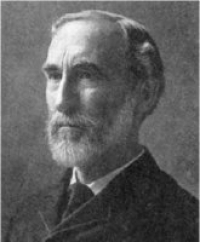Gibbs, Josiah Willard
Josiah Willard Gibbs (1839–1903), an American chemist and mathematical physicist, first formulated a concept of thermodynamic equilibrium of a system in terms of energy and entropy. Gibbs' insights led to the development of the field of thermochemistry. He studied at Yale University, and received his Ph.D. there in 1863, the first Doctor of Engineering in the United States. He was appointed Professor of Mathematical Physics at Yale in 1871. Interestingly, Gibbs did not publish his first work until 1873 when he was 34 years old. Few scientists who produce such innovative work as Gibbs did are 34 years of age before producing signs of their genius.
In 1873 Gibbs published the first two of his seminal papers, which described graphical methods for visualizing properties such as stability, equilibrium, and critical states for thermodynamic systems. One of his major accomplishments was showing the usefulness of the entropy quantity that the German mathematical physicist Rudolf Clausius had posited in 1865. This was followed in 1876 by On the Equilibrium of Heterogeneous Substances paper, in which he introduced the field of chemical thermodynamics, advancing the concept of chemical potential.
Gibbs developed the notion of free energy, a quantity that incorporated within itself both heat content and entropy and thus showed the tendency of the system to react or change. He also showed for the first time the uses of the differential (d) relationship in a system between energy U, pressure P, volume V, temperature T, and entropy S, the last a quantity then scarcely understood: dU = TdS - PdV. Many phenomena that had never been within the domain of thermodynamics were now subsumed by this equation, including elastic and surface phenomena, changes of phase, and many aspects of chemistry. Much of his work was published in a relatively obscure journal and Gibbs' contributions were unknown among prominent European chemists until they were translated into German by Ostwald in 1892, and into French by le Châtelier in 1899.
Gibbs also contributed to crystallography, the determination of planetary and comet orbits, and electromagnetic theory. James Clerk Maxwell was one of the first European scientists to recognize Gibbs as a theoretical physicist of international stature.
Further Reading
- H A Bumstead and R G Van Name (eds.), The scientific papers of J Willard Gibbs (2 volumes) (New York, (1961), xi-xxvi.
- R J Deltete, Gibbs and the energeticists, No truth except in the details, Boston Stud. Philos. Sci. 167 (Dordrecht, 1995), 135-169.
- R Dugas, Einstein et Gibbs devant la thermodynamique statistique, C. R. Acad. Sci. Paris 241 (1955), 1685-1687.
- K R Jolls, Gibbs and the art of thermodynamics, Gibbs in economics, Proceedings of the Gibbs Symposium (Providence, R.I., 1990), 293-321.
